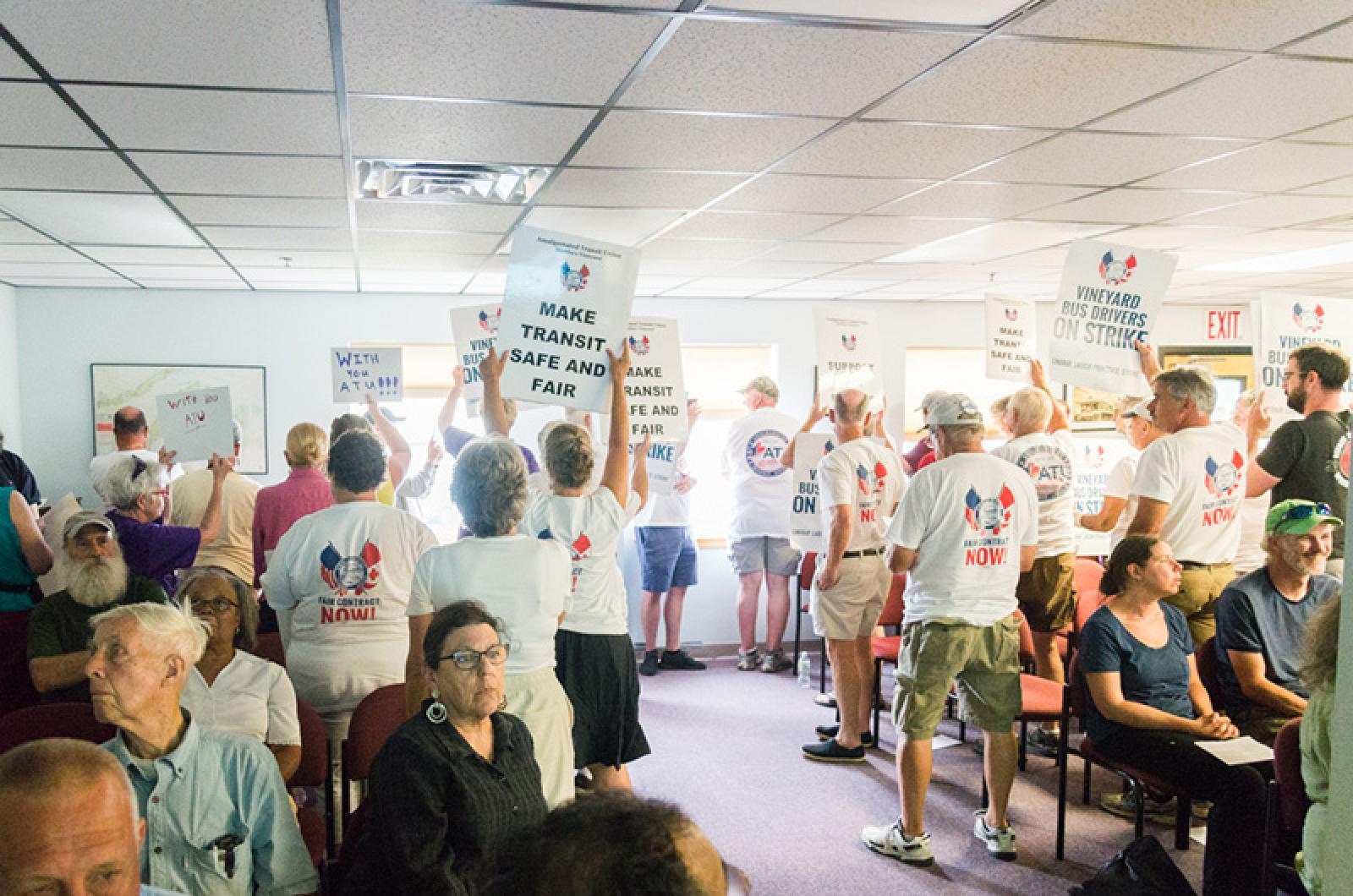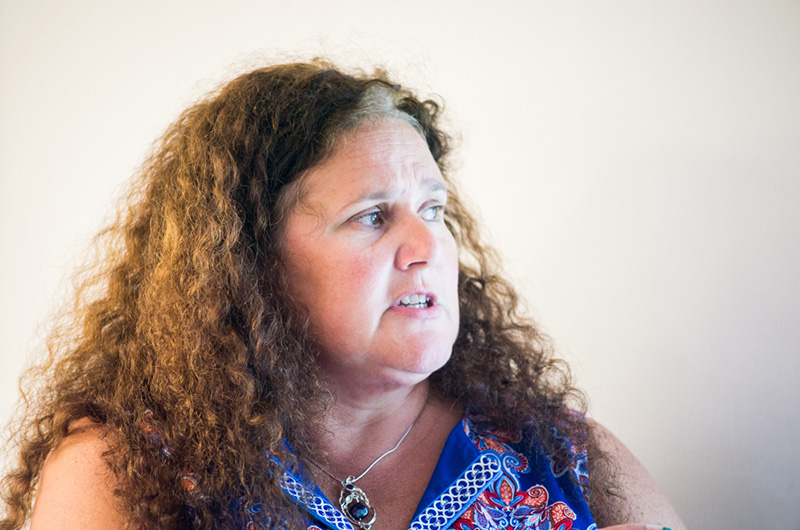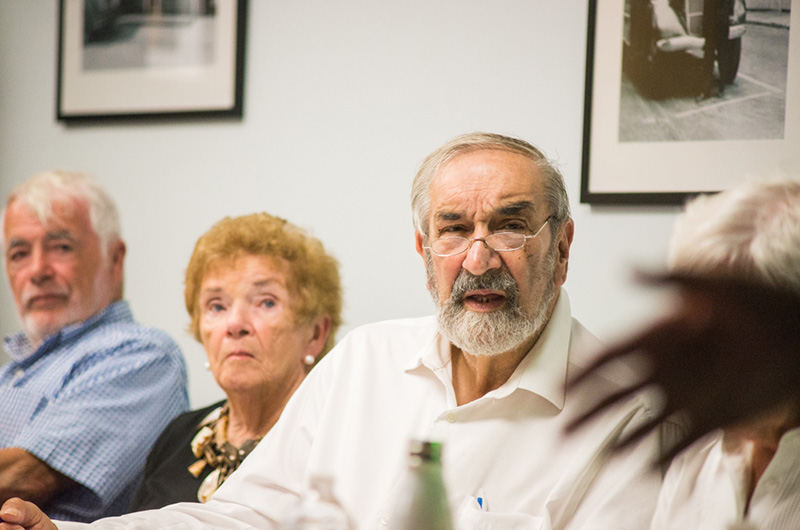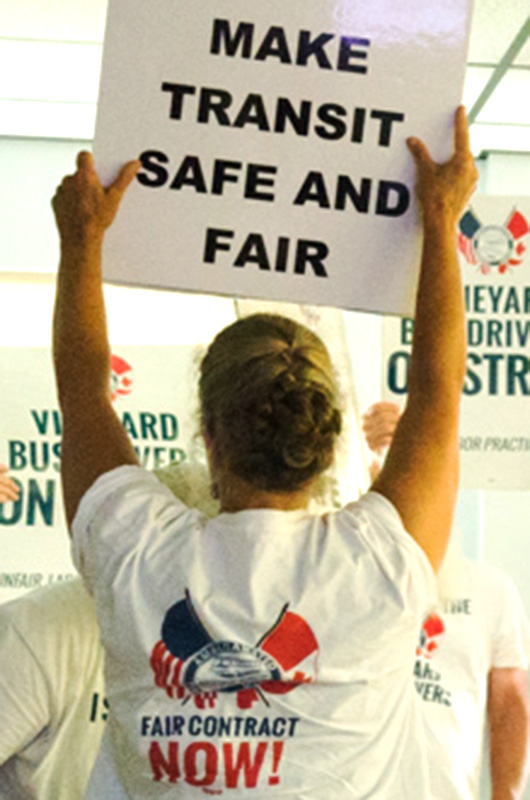Meeting for the first time since the driver strike began three weeks ago, a divided VTA board decided Wednesday after more than two hours of heated public testimony to send their subcontracted hiring company, TCI, back to the negotiating table.
Full-time VTA drivers voted to join the Amalgamated Transit Union in 2018. After contract talks broke down between the two sides in late June, 21 full-time drivers walked off the job to protest their wages, benefits and safety conditions, among other issues. Since then, the VTA has kept most buses running with a combination of replacement drivers and managers picking up routes. But as negotiations stalled, the VTA board, a group of appointed representatives from each Island town chartered with oversight responsibilities for the public transit authority, has remained relatively silent.
That changed on Wednesday.
In a meeting packed with striking drivers and their allies, the once-quiet board faced a tense, and at times hostile crowd as it discussed a strike that has morphed from a contained labor dispute into a charged political struggle. Two Edgartown police officers watched the door at the back of the room. Everyone else, including public officials from each of the six Island towns, watched the front.
Angela Grant, the VTA administrator who is hired by the board, began with a facts-and-figures presentation on the organization’s funding structure. She said state and federal government resource allocations have hamstrung the VTA, preventing concessions to the striking drivers’ requests for pay increases.
Ed Pigman, president of TCI, described the subcontracted hiring company as a middle man that hires drivers to run the VTA’s routes. Although the company’s contract lists labor relations as one of its responsibilities, the VTA reimburses TCI for wages for its hired drivers, meaning that TCI negotiators cannot concede to the drivers’ requests without approval from the VTA or its board, according to Mr. Pigman.
“Our position as the company that drives the buses is that it is not our money, the money belongs to the VTA,” Mr, Pigman said. “Our job is to perform the service that the VTA elects to fund.”
He further outlined the differences between TCI’s most recent offer and requested pay increases from the drivers. While TCI’s offer would cap wages for the highest paid drivers at $27 an hour, union drivers are asking to cap it at $29.06. Also in dispute are health care options, seniority benefits and driver representation in TCI decision making.
Although the exact numbers remain unclear, Mr. Pigman and Ms. Grant said 12,000 hours in service cuts — 18 per cent of the VTA’s total service — along with a $225,000 fare increase would be needed in order for TCI to accept the drivers’ offer. TCI’s offer would still require cuts of between five and six per cent to existing service.
“There’s a bit of a difference between the top wage, but the principal difference is how fast you get there,” Mr. Pigman said.
The roomful of striking drivers remained unsatisfied as both the VTA and TCI further unpacked the numbers. More than once during the presentation, striking drivers stood and turned their backs on the speakers in a show of protest. Many held signs.
The divisive tone of the meeting extended to the advisory board as well. Two members, Elaine Miller from Tisbury and June Manning from Aquinnah, broke ranks with the other representatives as they read letters supporting the drivers and expressing support for arbitration. Drivers have said they would end the strike if TCI agreed to arbitration.
But three other board members, John Alley of West Tisbury, Alice Butler of Oak Bluffs, and Lenny Jason of Chilmark, expressed hesitation about agreeing to an arbitrator considering the already cash-strapped VTA budget. Tension reached a boiling point when Ms. Manning said she had been silenced at previous meetings, describing how Mr. Alley told her, “sometimes it’s better just to be quiet and shut up.”
“In your case, that’s probably true,” Mr. Alley shot back. He later apologized for the comments.
But the board remained divided, even as focus shifted to the striking drivers and community members who stood to voice their concerns with the lack of negotiations. Former board member Russell Ashton expressed frustration with the current board’s lack of transparency, an issue he said goes back to his time as a representative. Others raised questions about the VTA’s unpublished minutes from its April meeting, its lack of meetings overall, and its hiring of a labor relations consultant as well as replacement drivers.
Cutting through it all was the larger sentiment that the breakdown in talks have served to divide a tight-knit Island community.
“These drivers are our community,” said Aquinnah resident and rider Kathy Olson. “They are our neighbors, they are who are employees rely on to get to work. I have been struck by all of the discussion today, nobody is talking about TCI and their finances . . . they have no right to come in and drive us against each other as they are doing.”
Town officials also spoke, most of them pushing for further negotiations while expressing an understanding that the VTA has a responsibility to operate on a tight budget.
Edgartown town administrator James Hagerty said it would be “unacceptable to cut any routes.”
Oak Bluffs selectman Brian Packish said it was important to find a middle ground.
“The crux of the issue here today is that no one is at the negotiating table,” Mr. Packish said. “I would like to see or hear the board come together and say, ‘Come back to the table TCI, come back to the table ATU.’”
Aquinnah town administrator Jeffrey Madison agreed.
“You’ve got to do something to solve the situation,” he said.
Spurred by the testimony of public officials, board member Elaine Miller called a vote on whether to support arbitration. The vote ended in a 3-3 deadlock, with Mr. Alley, Ms. Butler, and Mr. Jason voting against the measure. (The eight-member board is down two members after Edgartown’s representative on the board, Louis Paciello, resigned his post two weeks ago, leaving a second vacant seat. The board was already missing its disability representative).
The board then took a vote on whether to support further negotiations without sending them to an arbitrator. That measure passed unanimously, marking a final moment of unity in an otherwise contentious evening.
The board agreed to have TCI and the union sit down for negotiations at the convenience of the federal mediator. Proposed dates were either July 22 and 23 or July 29, 30 and 31.
Board members also agreed to reconvene on August 2 to discuss the outcome of negotiations.
“It’s a step in the right direction,” said Andre Bonnell, a striking driver. “Selectmen and town administrators were here, and they got to hear the other side.”










Comments (7)
Comments
Comment policy »